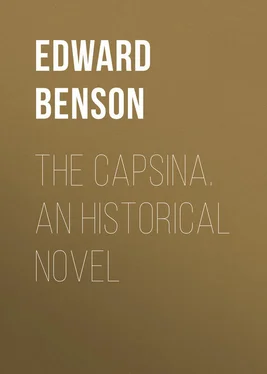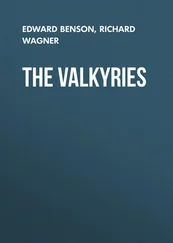Edward Benson - The Capsina. An Historical Novel
Здесь есть возможность читать онлайн «Edward Benson - The Capsina. An Historical Novel» — ознакомительный отрывок электронной книги совершенно бесплатно, а после прочтения отрывка купить полную версию. В некоторых случаях можно слушать аудио, скачать через торрент в формате fb2 и присутствует краткое содержание. Жанр: foreign_language, foreign_prose, на английском языке. Описание произведения, (предисловие) а так же отзывы посетителей доступны на портале библиотеки ЛибКат.
- Название:The Capsina. An Historical Novel
- Автор:
- Жанр:
- Год:неизвестен
- ISBN:нет данных
- Рейтинг книги:4 / 5. Голосов: 1
-
Избранное:Добавить в избранное
- Отзывы:
-
Ваша оценка:
- 80
- 1
- 2
- 3
- 4
- 5
The Capsina. An Historical Novel: краткое содержание, описание и аннотация
Предлагаем к чтению аннотацию, описание, краткое содержание или предисловие (зависит от того, что написал сам автор книги «The Capsina. An Historical Novel»). Если вы не нашли необходимую информацию о книге — напишите в комментариях, мы постараемся отыскать её.
The Capsina. An Historical Novel — читать онлайн ознакомительный отрывок
Ниже представлен текст книги, разбитый по страницам. Система сохранения места последней прочитанной страницы, позволяет с удобством читать онлайн бесплатно книгу «The Capsina. An Historical Novel», без необходимости каждый раз заново искать на чём Вы остановились. Поставьте закладку, и сможете в любой момент перейти на страницу, на которой закончили чтение.
Интервал:
Закладка:
This being done, the remainder of the Greek fleet weighed anchor and went north again. While rounding Lesbos they met the ships which had pursued the rest of the Ottoman fleet returning. They, too, had shunned the Greeks, but with the south wind had escaped into the Dardanelles, where the Greeks had not ventured to follow. Most of the pursuing vessels had been of the primates, and the Capsina expressed her scorn in forcible language.
Aivali was a wealthy commercial town in the pashalik of Brusa and on the coast of Asia Minor. Since the outbreak of the war several similar Greek towns had been plundered by irregular bands of Turks, and the pasha, seeing that his revenues were largely derived from Aivali, for it was the home of many wealthy Greeks, was personally very anxious to save it. Thus the troops which, as Tombazes had been truly informed, had been sent there, were designed not for its destruction but its preservation. But the news of the destruction of the ship at Erissos had raised the excitement of the Turkish population at Aivali and desire for revenge to riot point, and already several Greeks had been murdered in the streets. Such was the state of things when Tombazes' fleet dropped anchor outside the harbor.
That night, under cover of the darkness, came a deputation to the admiral. Unless he helped them their state was foregone. Their protectors would no doubt guarantee them their lives, but at the sacrifice of all their property; but, as seemed certain if the Turkish population rose against them (for they had heard that irregular bands of soldiers were marching on the town), the luckier of them would be murdered, the fairer and less fortunate sold as slaves. They appealed to Tombazes to rescue them, and take them off on the fleet, and this he guaranteed his best efforts to do.
Aivali was built on a steep hill-side running up from the sea. The lower ground was occupied with wharves and shipping-houses, then higher up came the manufacturing quarter, consisting mainly of oil-mills, and on the crest of the hill the houses of the wealthier inhabitants. It was these which would be the first prey to the mob.
Early next morning Tombazes landed a company of soldiers to protect the families who embarked. The troops of the pasha, who wished to prevent any one leaving the town, replied by occupying a row of shops near the quay, and keeping up a heavy musket fire on the troops and the ships. Meantime the news that the Greek fleet would take off the inhabitants was over the town, and a stream of civilians had begun to pour down. The soldiers returned the fire of the Turks, while these were embarked in small boats and taken out to the ships; but the odds were against them, for their assailants were firing from shelter. But suddenly a shout went up from the fleet as the Sophia weighed anchor, and, hoisting her sails, came close in, shouldering and crashing through a line of fishing-boats, risking the chance of grounding. Then, turning her broadside to the town, she opened on the houses occupied by the Turks, firing over the heads of the soldiers and embarking population. The first broadside knocked one shop to pieces, and in a couple of minutes the Turks, most of the regular troops, were swarming out of houses like ants when their hill is disturbed, and flying to some position less exposed to the deadly and close fire of the Sophia .
Simultaneously the Greeks of the town, fearing that this occupation of the houses lower down by the regular troops should cut off their escape, in turn occupied some houses in the rear, and kept up another fire on them. Between the Sophia and them the troops were fairly outclassed, and the line of retreat for the population was clear again.
But this engagement of the regular troops with the Greeks gave the rabble of the Turkish population the opportunity they desired. They rushed to the bazaar and rifled the shops, spoiling and destroying what they did not take; and, after leaving the quarter gutted and trampled, made up the hill to the houses of the wealthiest merchants, from which the Greeks were even now fleeing, and captured not only goods, but women and children. Unless some speedy move was made by the troops, it was clear that the bulk of the population would escape or fall into the murderous hands of the rabble; and unable, under the guns of the Sophia , to make another attempt to hold the quay against the Greeks, they set fire to various houses in a line with the shore, that a barrier of flames might cut off the lower town from the upper. Meantime they collected again at the square which lay to the left of the town, with the purpose of making another formed attack on the troops on the beach. The Greek soldiers seeing this, as it was now hopeless to try to save the town from burning, themselves set fire to another row of houses at right angles to the beach in order to cut them off from the line of embarkation, and between the quay and the new position taken up by the Turkish troops. In a short time both fires, under the ever-freshening sea-breeze took hold in earnest.
Meantime boat-load after boat-load of the sailors had put to land; among the first, when the guns of the Sophia were no longer needed, being the Capsina and Kanaris, with some two dozen of the crew. They went up the town to help in protecting the line of retreat, and the fires being then only just begun, passed the oil-mills, and reached the wealthier quarter. The Turkish population, seeing they were armed, ran from them, and in an hour, having satisfied themselves that the upper quarter of the town was empty, turned back again towards the sea. But suddenly from some quarter of a mile in front of them rose a huge pillar of smoke and fire, and with it a deep roaring sound as if all the winds of heaven had met together. Kanaris first saw what it was.
"Quick, quick," he said, "it is an oil-mill caught! There is a whole row of them below us!"
They hurried on, but before they had gone many yards they saw at the end of the street down which they were to pass another vast volume of flame break out, sweeping across to the opposite houses in long tongues of fire. From inside the mill came a crash, and next moment a river of flaming oil flowed out and down the street. To pass that way was impossible, and they turned back to make a détour to the other side of the town, away from the quarter where the troops were assembled. But before ten minutes had passed a dozen more mills had taken fire, and when at length they had passed the extremity of the line of fire, and came out on the quay, it was to find the beach empty, and the boats no longer at the shore. The torrent of flaming oil had poured down the steep and narrow streets, and thence across the quay over on to the water, where it floated, still blazing, and a belt of fire some thirty feet broad lined the water along the bay. The charred posts on the edge of the harbor-wall were hissing and spluttering, sending out every now and then little lilac-colored bouquets of flame, and it was somehow across that burning canal that their retreat lay.
The Capsina stood still a moment and then broke out into a laugh.
"We shall get through tighter places together, Kanaris," she said. "See, the oil has already ceased flowing, but we cannot stop here. The troops may be down again. Look you, there is only one way. A run, a good long breath, a dive; if we catch fire, next moment the water will put it out – and up again when we are past the flames. It is not more than thirty feet."
Meantime the Turkish troops hearing that one party, at any rate, of the Greeks was still in the town, and thinking that all retreat by the beach was now cut off, had stationed themselves away to the left beyond the flames. The Capsina waved her hand to them.
"No, no, we don't go that way, gentlemen!" she cried, and next moment she had run the dozen scorching and choking yards across the quay and plunged into the flames. Kanaris followed, and after him the others with a shout. The Turks, seeing this, discharged their muskets at them, but ineffectually. A moment later a boat had put off from the Sophia , and, as they rose safe beyond the flames they were dragged on board dripping, yet strangely exhilarated and thrilled with adventure.
Читать дальшеИнтервал:
Закладка:
Похожие книги на «The Capsina. An Historical Novel»
Представляем Вашему вниманию похожие книги на «The Capsina. An Historical Novel» списком для выбора. Мы отобрали схожую по названию и смыслу литературу в надежде предоставить читателям больше вариантов отыскать новые, интересные, ещё непрочитанные произведения.
Обсуждение, отзывы о книге «The Capsina. An Historical Novel» и просто собственные мнения читателей. Оставьте ваши комментарии, напишите, что Вы думаете о произведении, его смысле или главных героях. Укажите что конкретно понравилось, а что нет, и почему Вы так считаете.











